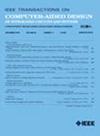An r-DFA-Based Layout Pattern Match Method Supporting Fuzzy Matching
IF 2.9
3区 计算机科学
Q2 COMPUTER SCIENCE, HARDWARE & ARCHITECTURE
IEEE Transactions on Computer-Aided Design of Integrated Circuits and Systems
Pub Date : 2025-04-01
DOI:10.1109/TCAD.2025.3556969
引用次数: 0
Abstract
As chip manufacturing approaches physical limits, the probability of defects due to specific chip layout structures has significantly increased. These defect-prone structures are known as lithographic hotspots. Pattern matching method is widely used in hotspot detection algorithms due to its efficiency and accuracy. However, traditional pattern matching algorithms face major challenges in both solution efficiency and flexibility for fuzzy matching. To overcome these limitations, an integer range-based deterministic finite automaton (r-DFA)-based layout pattern matching method supporting parallelization and fuzzy matching is proposed. Manhattan polygons in the layout are represented as multiple path strings, thereby transforming the pattern matching problem into a string regular expression search problem. To simplifies the construction of large integer range elements in fuzzy matching, the r-DFA is employed, enhancing construction efficiency and enabling the algorithm to achieve linear time complexity. Moreover, this approach focuses most of the matching process within each individual layout polygon, enabling parallelized matching across diverse layout polygons. Compared to the state-of-the-art, our approach supports fuzzy matching, and shows an average efficiency improvement of 1.23 times.基于r- dfa的支持模糊匹配的布局模式匹配方法
随着芯片制造接近物理极限,由于特定芯片布局结构而导致缺陷的概率显著增加。这些容易出现缺陷的结构被称为光刻热点。模式匹配方法以其高效、准确的特点被广泛应用于热点检测算法中。然而,传统的模式匹配算法在求解模糊匹配的效率和灵活性方面都面临着很大的挑战。为了克服这些局限性,提出了一种支持并行化和模糊匹配的基于整数范围的确定性有限自动机(r-DFA)的布局模式匹配方法。将布局中的Manhattan多边形表示为多个路径字符串,从而将模式匹配问题转化为字符串正则表达式搜索问题。为了简化模糊匹配中大整数范围元素的构造,采用了r-DFA,提高了构造效率,使算法达到线性时间复杂度。此外,该方法将大部分匹配过程集中在每个单独的布局多边形内,实现了跨不同布局多边形的并行匹配。与最先进的方法相比,我们的方法支持模糊匹配,平均效率提高了1.23倍。
本文章由计算机程序翻译,如有差异,请以英文原文为准。
求助全文
约1分钟内获得全文
求助全文
来源期刊
CiteScore
5.60
自引率
13.80%
发文量
500
审稿时长
7 months
期刊介绍:
The purpose of this Transactions is to publish papers of interest to individuals in the area of computer-aided design of integrated circuits and systems composed of analog, digital, mixed-signal, optical, or microwave components. The aids include methods, models, algorithms, and man-machine interfaces for system-level, physical and logical design including: planning, synthesis, partitioning, modeling, simulation, layout, verification, testing, hardware-software co-design and documentation of integrated circuit and system designs of all complexities. Design tools and techniques for evaluating and designing integrated circuits and systems for metrics such as performance, power, reliability, testability, and security are a focus.

 求助内容:
求助内容: 应助结果提醒方式:
应助结果提醒方式:


